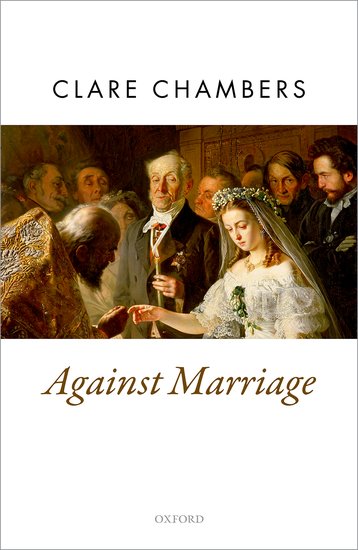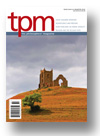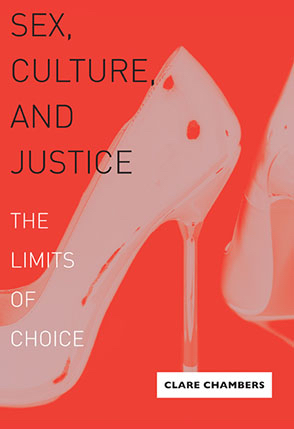multiculturalism and religion
- all posts on culture and religion, all posts on feminism, all posts on liberalism, articles, feminism, liberalism, multiculturalism and religion
Respect, Religion, and Feminism
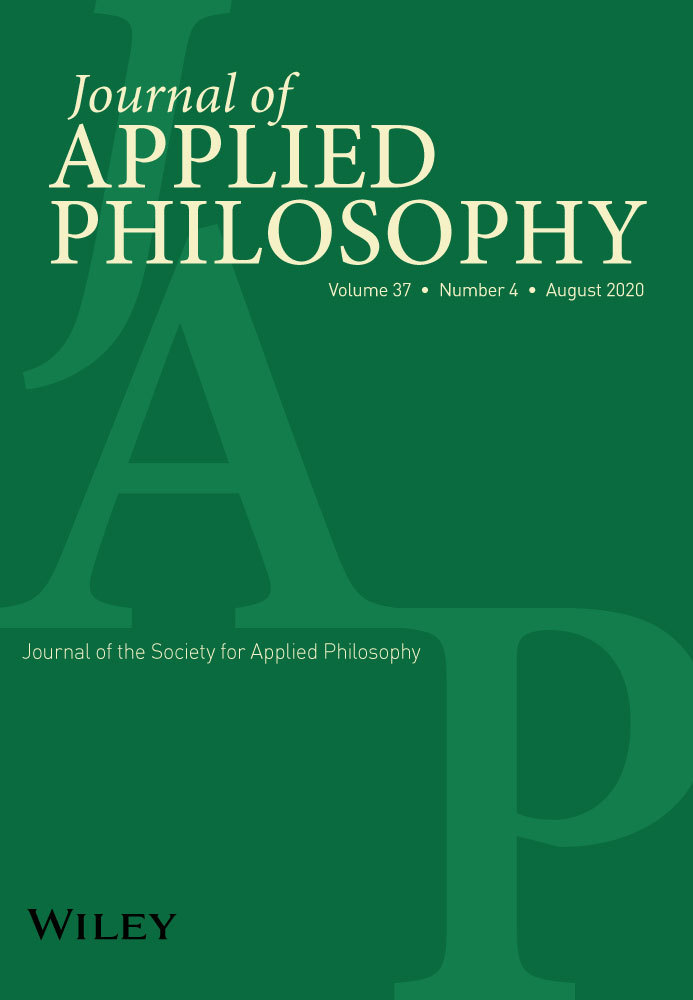
Respect, Religion, and Feminism: Comments on Lori Watson and Christie Hartley, Equal Citizenship and Public Reason: A Feminist Political Liberalism is published in Journal of Applied Philosophy September 2020. You can read the paper here.
Abstract: There is significant disagreement among feminists and liberals about the compatibility between the two doctrines. Political liberalism has come under particular criticism from feminists, who argue that its restricted form of equality is insufficient. In contrast, Lori Watson and Christie Hartley argue that political liberalism can and must be feminist. This article raises three areas of disagreement with Watson and Hartley’s incisive account of feminist political liberalism. First, it argues that an appeal to a comprehensive doctrine can be compatible with respecting others, if that appeal is to the value of equality. Second, it takes issue with Watson and Hartley’s defence of religious exemptions to equality law. Third, it argues that political liberalism can be compatible with feminism but that it is not itself adequately feminist. It concludes that political liberalism is not enough for feminists.
- Against Marriage, all posts on feminism, all posts on liberalism, all posts on marriage, feminism, liberalism, multiculturalism and religion, publications on marriage
Against Marriage: An Egalitarian Defence of the Marriage-Free State
Against Marriage was published by Oxford University Press in 2017, with a paperback in 2019. Read the book on Oxford Scholarship Online here.Winner of the APSA David Easton Award 2018.
Synopsis
Against Marriage is a radical argument for the abolition of state-recognised marriage. Clare Chambers argues that state-recognised marriage violates both equality and liberty, even when expanded to include same-sex couples. Instead Chambers proposes the marriage-free state: an egalitarian state in which religious or secular marriages are permitted but have no legal status.
Part I makes the case against marriage. Chambers investigates the critique of marriage that has developed within feminist and liberal theory. Feminists have long argued that marriage is a violation of equality since it is both sexist and heterosexist. Chambers endorses the feminist view and argues, in contrast to recent egalitarian pro-marriage movements, that same-sex marriage is not enough to make marriage equal. Chambers argues that state-recognised marriage is also problematic for liberalism, particularly political liberalism, since it imposes a controversial, hierarchical conception of the family that excludes many adults and children.
Part II sets out the case for the marriage-free state. Chambers critically assesses recent theories that attempt to make marriage egalitarian, either by replacing it with relationship contracts or by replacing it with alternative statuses such as civil union. She then sets out a new model for the legal regulation of personal relationships. In the marriage-free state regulation is based on relationship practices not relationship status, and these practices are regulated separately rather than as a bundle. The marriage-free state thus employs piecemeal, practice-based regulation. Finally, Chambers considers how the marriage-free state should respond to unequal religious marriage. The result is an inspiring egalitarian approach that fits the diversity of real relationships.
Reviews
“Clare Chambers has produced what will surely be for years to come the definitive argument for the abolitionist view of marriage. … [T]his is in my opinion a superb book. It is prodigiously scholarly, but at the same time wonderfully clear and accessible. The arguments are provocative and challenging throughout. The literature on this vitally important topic urgently needed a book-length defense of the abolitionist position. It is hard to imagine a book performing this necessary role better than Chambers’s Against Marriage.”
Ralph Wedgwood in Ethics
Against Marriage is “political philosophy at its most practical and readable.”
Andrew Harrop, General Secretary of the Fabian Society, in Fabian Review
“This is a distinct and important contribution to an increasingly crowded field of liberal political philosophy on marriage and the state and, perhaps most interestingly, to our understanding of the liberal project broadly. … Where other liberals seek more vigorously to balance competing demands of freedom and equality, or emphasize freedom, Chambers hews rigorously to an egalitarian position. You won’t find another book that does this so effectively or by way of such productive engagement with existing scholarship. Laying out the egalitarian case in such clear and compelling terms, Chambers highlights the challenges it presents to the liberal side of her liberal feminist equation. In so doing, Against Marriage leaves us wondering just how tenable the liberal feminist project is. … Chambers leads us to these questions by bringing us to the edge of the liberal feminist frontier. This alone would make Against Marriage a distinct and important contribution. But, of course, Chambers does more. She offers a compelling vision of why and how to move beyond marriage and points us in the direction of work that needs to be done. All with the grace and graciousness of an analytical philosopher running at full throttle.”
Tamara Metz in Political Theory
“Against Marriage makes an important contribution to the debate over the future of marriage within liberalism. It is clear and cogently argued and a pleasure to read. One of its virtues is its breadth; it makes arguments which address a range of liberal and feminist views and should be accessible to non-specialists. At the same time, it advances the leading edge of the specialist debate in provocative and intriguing ways.”
Elizabeth Brake in Mind
“Clare Chambers provides a clear, lucid and timely argument against state-recognized marriage based on the liberal principles of liberty and equality. … Throughout, she is masterful at anticipating and responding carefully to potential objections to her arguments and proposals. …. And her responses to those who might disagree with her proposals reveal a two-fold carefulness: as a philosopher, she is thoughtful, deliberate, precise, and meticulous; as a feminist, she is attentive, concerned, and compassionate — considering not only the philosophical justifications for her proposals but also their practical fall out for women and other vulnerable populations. … I highly recommend Chambers’ book as an important scholarly and pedagogical resource. It is beautifully crafted and makes an important contribution to the literature in liberal political theory and, more specifically, to the philosophical literature on marriage and family. … It was my distinct pleasure to read this book and be provoked by its arguments into a better understanding of both liberalism’s promise and its limitations with regard to its support of diverse forms of relationship.”
Shelley M. Park in Notre Dame Philosophical Reviews
“Chambers’ Against Marriage is a wonderful addition to a growing literature demanding that we think seriously about the institution of marriage and how it may have to be altered to meet the demands of justice and equity.”
Robert Scott Stewart in Metapsychology Online Reviews
- all posts on culture and religion, all posts on the body and beauty, articles, multiculturalism and religion, the body
Medically unnecessary genital cutting and the child’s right to bodily integrity: an international expert consensus statement
In American Journal of Bioethics Vol. 19 (2019).
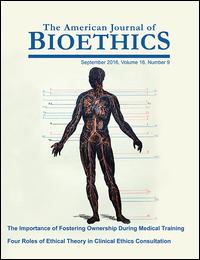
Keeping our focus exclusively on a Western context for the purposes of this article, we argue as follows: Under most conditions, cutting any person’s genitals without their informed consent is a serious violation of their right to bodily integrity. As such, it is morally impermissible unless the person is nonautonomous (incapable of consent) and the cutting is medically necessary.
This paper is authored by the Brussels Collaboration on Bodily Integrity (2019).
This work grew out of informal discussions among participants in the G3 International Experts Meeting on FGM/C in Brussels, Belgium, May 20-22, 2019, along with other scholarly collaborators. We are physicians, ethicists, nurse-midwives, public health professionals, legal scholars, political scientists, anthropologists, psychologists, sociologists, philosophers, and feminists from Africa, Asia, Australasia, Europe, the Middle East, and the Americas with interdisciplinary expertise in child genital cutting practices across a wide range of cultural contexts.
You can read the paper here.
Corresponding author: Brian D. Earp, Associate Director, Yale-Hastings Program in Ethics and Health Policy, Yale University and The Hastings Center, 2 Hillhouse Avenue, New Haven, CT, 06511, USA. E-mail: brian.earp@gmail.co
- all posts on culture and religion, all posts on liberalism, all posts on the body and beauty, liberalism, multiculturalism and religion, the body
Reasonable Disagreement and the Neutralist Dilemma
 Chambers, Clare, “Reasonable Disagreement and the Neutralist Dilemma: Abortion and circumcision in Matthew Kramer’s Liberalism with Excellence” in The American Journal of Jurisprudence (May 2018).
Chambers, Clare, “Reasonable Disagreement and the Neutralist Dilemma: Abortion and circumcision in Matthew Kramer’s Liberalism with Excellence” in The American Journal of Jurisprudence (May 2018).You can read the paper here.
Abstract: This paper starts by investigating the idea of reasonable disagreement. It then considers Matthew Kramer’s argument that there is no neutral solution available to the disagreement over abortion. The paper argues that Kramer’s account has wider application, and identifies a neutralist dilemma. The neutralist dilemma applies when, of two policy options available to the state, one is unreasonable. It follows that the state should enact only the reasonable policy. However, in a neutralist dilemma the fact of reasonable disagreement due to the burdens of judgment means that it is not possible for the state to act at all, whether legislating or not, without deviating from neutrality. The paper develops the concept of the neutralist dilemma and then applies it to another case discussed by Kramer: infant circumcision. The paper argues that the debate over infant circumcision can be framed as a neutralist dilemma, but that the most plausible resolution of the dilemma results in an argument in favor of the legal prohibition of the practice. This is a surprising result, since most liberal states do not restrict circumcision and since prohibition of circumcision might initially appear to be non-neutral or even illiberal; however it is consistent with the tenets of neutralist liberalism.
-
Conscience and Context
In Political Emotions: Toward a Decent Public Sphere, edited by Thom Brooks (Palgrave MacMillan, forthcoming).
In The New Religious Intolerance Martha Nussbaum sets out an impassioned plea against that intolerance, which she sees as a pressing but almost entirely European problem. Although there are differences between European nations, Nussbaum argues, Europeans in general have a variety of problematic attitudes to religious diversity that are not found in the USA. These include “fear and mistrust,” inconsistency, “a concern for homogeneity that leads them to commit some errors in public argument that are troubling,” the desire that immigrants “fit in,” greater anti-Semitism than is found in the USA, and a refusal to debate, let alone embrace, “the free exercise of religion”. In place of this European foolishness “the American solution is urgently needed.” The New Religious Intolerance is thus at once a critique of the ‘European’ way of dealing with religion and a defence of the superior American way. Events since Nussbaum published NRI suggest that both Europeans and Americans have grounds for deep soul-searching and self-criticism concerning attitudes to immigration and diversity. In this paper I offer a critique not of the political implications of Nussbaum’s account, but rather of its philosophical underpinnings. My argument proceeds through analysis of her critique of a legal ban on the burqa which has been implemented in various ways in France, Belgium, and Italy
- all posts on culture and religion, all posts on liberalism, articles, liberalism, multiculturalism and religion, read
Liberal Views
- all posts on culture and religion, all posts on feminism, all posts on liberalism, all posts on social construction, all posts on the body and beauty, beauty, feminism, liberalism, multiculturalism and religion, Sex, Culture, and Justice, social construction, the body
Sex, Culture, and Justice: The Limits of Choice
Sex, Culture, and Justice: The Limits of Choice was published in hardback and paperback by Penn State University Press in 2008. An e-book is also available. You can buy all versions here.
Autonomy is fundamental to liberalism. But autonomous individuals often choose to do things that harm themselves or undermine their equality. In particular, women often choose to participate in practices of sexual inequality-cosmetic surgery, gendered patterns of work and childcare, makeup, restrictive clothing, or the sexual subordination required by membership in certain religious groups. In this book, Clare Chambers argues that this predicament poses a fundamental challenge to many existing liberal and multicultural theories that dominate contemporary political philosophy. Chambers argues that a theory of justice cannot ignore the influence of culture and the role it plays in shaping choices. If cultures shape choices, it is problematic to use those choices as the measure of the justice of the culture. Drawing upon feminist critiques of gender inequality and poststructuralist theories of social construction, she argues that we should accept some of the multicultural claims about the importance of culture in shaping our actions and identities, but that we should reach the opposite normative conclusion to that of multiculturalists and many liberals. Rather than using the idea of social construction to justify cultural respect or protection, we should use it to ground a critical stance toward cultural norms. The book presents radical proposals for state action to promote sexual and cultural justice.
Amazon UK: http://www.amazon.co.uk/Sex-Culture-Justice-Limits-ebook/dp/B001UE6M1G/
Amazon US: http://www.amazon.com/Sex-Culture-Justice-Limits-ebook/dp/B001UE6M1G/
Reviews
“[A]n interesting, important, wide-ranging and well-argued book that contains a controversial proposal that will, no doubt, be widely debated.”
—Times Higher Education“[A]n important book. … Very few first-rate analytical thinkers … engage with social theorists: Chambers is a notable exception, and if only for that reason, her contribution should serve as a model for any endeavour of this kind. … Moreover, its strength lies not merely in the author’s mastery of two disparate intellectual traditions, but also in its cogent and provocative defence of a number of proposals.“
—Philosophy“[E]xtremely successful. … Testament to her scholarly rigour, Chambers skilfully avoids alienating either side of the academic divide [between analytical and continental philosophy]; achieving her stated aim, she undermines the foundations upon which such divides are rooted. … This opportune and tightly argued work reveals the extent to which equality and justice cannot be guaranteed by a political liberalism which venerates autonomy to the exclusion of other important values. Setting itself apart from other work in its field, this book forms, albeit on its own terms, part of the solution.”
—Feminist Theory“Chambers’ work makes a highly valuable contribution to contemporary philosophical debates. … Chambers’ work represents a great advance in attempting to forge a path between two positions which are so often considered to be diametrically opposed. The project … is a vital one. … [T]he value of the theoretical contribution, both to liberal and feminist philosophy, is indisputable.”
—Res Publica“Her interwoven arguments … are complex, meticulous and inventive. … [T]here is real potential here for this book to alter mainstream liberal thinking.”
—Feminist Review“An incisive, well-written book with a sustained, original argument.”
—Ruth Abbey, University of Notre Dame“The book contributes significantly to the literature of liberalism, autonomy, and feminism.”
—Ann Cudd, University of Kansas“Chambers’ refreshing approach has the potential to expand the scope of conventional liberal theory by showing how liberals can (and should) directly meet the challenge of postmodern approaches and by demonstrating that feminist contributions are the well from which most innovations in liberalism are drawn.”
—Avigail Eisenberg, University of Victoria - all posts on culture and religion, all posts on feminism, all posts on the body and beauty, articles, feminism, liberalism, multiculturalism and religion, the body
Autonomy and equality in cultural perspective: Response to Sawitri Saharso
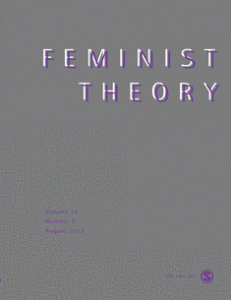 Feminist Theory Vol. 5 No. 3 (December 2004).
Feminist Theory Vol. 5 No. 3 (December 2004).This paper criticises Sawitri Saharso’s argument that hymen repair surgery and sex-selective abortion can be both multiculturalist and feminist policies.
You can read the paper here.
- all posts on culture and religion, all posts on liberalism, articles, liberalism, multiculturalism and religion
Nation-building, Neutrality and Ethnocultural Justice: Kymlicka’s ‘Liberal Pluralism’
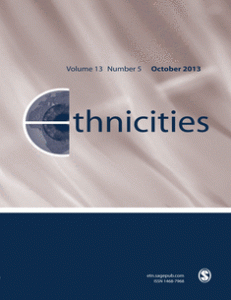 Ethnicities Vol. 3 No. 3 (September 2003).
Ethnicities Vol. 3 No. 3 (September 2003).This paper takes issue with Will Kymlicka’s arguments on ethnocultural justice. It argues that liberal nation-building is not the same thing as minority nation-building, and that the former need not cause injustice to minority ethnocultural groups.
You can read the paper here.
- all posts on culture and religion, all posts on liberalism, chapters, liberalism, multiculturalism and religion
All must have prizes: the liberal case for intervention in cultural practices
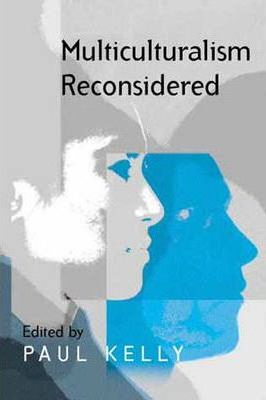 Paul Kelly (ed.) Multiculturalism Reconsidered: Culture and Equality and its Critics (Polity Press, 2002).
Paul Kelly (ed.) Multiculturalism Reconsidered: Culture and Equality and its Critics (Polity Press, 2002).This paper highlights a rare aspect of Brian Barry’s Culture and Equality that is not liberal enough: his assertion that unequal outcomes are unproblematic if they have been chosen. The paper argues instead that an ‘equality tribunal’ should be empowered to rule against certain forms of discrimination within groups.
